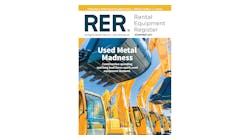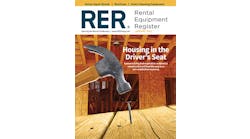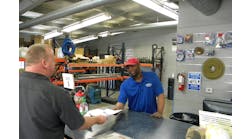I hear a lot of rental executives talk about more efficient utilization of assets these days. Rental companies are more careful about buying equipment economically and analyzing the service and support they'll receive in return from manufacturers. They are approaching their own service departments in a far more scientific manner, using software to maximize the performance of their fleet by more carefully tracking service intervals and performance.
And what's good for the rental market in the long run is that customers of rental companies are doing the same thing. The customer has become smarter. They are held to stricter accountability when it comes to bringing jobs in under budget. For that reason rental is more attractive than ever before and will continue to be so, especially if there's a bit of a slowdown on the horizon.
Residential construction is softening, which will eventually affect commercial building as fewer strip malls and retail outlets will be built. A recent report I read estimates non-residential construction at about a 7.5-percent increase this year and expectations are that 2008 will be somewhat similar but probably softer.
While slower construction activity obviously doesn't help rental companies' immediate fortunes, there is often a positive long-term effect in that customers are more likely to look more closely at the rental option. They will be less inclined to invest a lot of capital in equipment and they'll be watching their bottom lines more carefully.
One of the most important capabilities a rental salesman can have is selling the long-term benefits of rental. Sure, every salesman can go see a client and try to beat the competitors' rates. With a little more skill, a salesman might succeed in convincing a prospective customer that his particular company can provide superior service, but that can only be achieved if those elements of service are there.
But real gains in market share come — and many RER 100 executives agree with this point — from convincing non-renters or occasional renters to rent more. If you can show a purchasing agent from a construction company how renting from you will help him save money and do his job more effectively, you'll really become an ally in helping that company improve its business. And if that company rents more, it is likely to be loyal to the people who showed it how to save money.
Larger rental companies in recent years have re-wired their businesses to cater to potentially larger customers. To satisfy the needs of larger companies, rental companies need to leverage technology to enhance efficiencies. Being able to service equipment more quickly and in a more timely manner, picking it up more quickly when it's called off rent — these sound like small things but it is all about uptime and getting a machine back on the ready line more quickly.
Standing in a long concession line at the Bauma show in Munich last month I chatted with a Dutch contractor who does jobs in the Netherlands, Germany and a few other countries. He told me he only recently became committed to renting for up to 50 percent of his equipment needs, whereas in the past he preferred to own it all. I asked him what made him change and he said it started when he saw that rental companies were quicker and more efficient than his staff was when it came to repairing and sourcing machines. And, he added, when faced with a complex job, a rental company salesman helped him design a step-by-step plan for getting the job done, helping solve the logistics of moving equipment in and out of a remote site and showing him tangibly how he could achieve his aims more economically through rental. The man added that in the past he'd viewed the staff of rental companies as order-takers who didn't make the effort to understand his business, much less really take the time to work with him. But that had changed.
Talking to RER 100 executives this year, I heard a greater commitment to training than I've ever heard before. I hope the designers of these training programs consider working with sales staff to help them develop this kind of capability, the ability to convince customers not only to use your company's service, but to utilize the rental option more. If the industry continues to become more efficient and productive, it can't help but attract customers who will recognize the benefits. Training that kind of capability doesn't happen overnight, but it can be developed with the right kind of vision and foresight.





